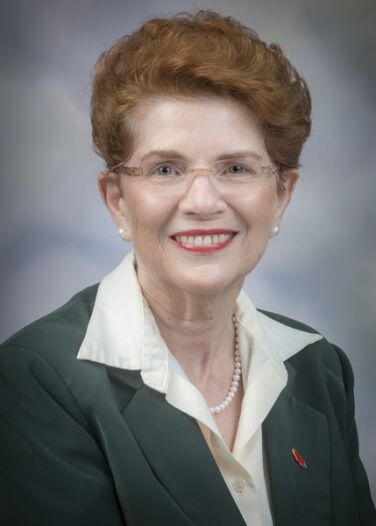The San Antonio Heart and Mind Study is an extension of previous research conducted from 1979 to 2006.
The University of Texas Health Science Center at San Antonio has received a five-year, $15.5 million grant to conduct the San Antonio Heart and Mind Study, an investigation of why the region’s older Mexican Americans experience a higher rate of dementia than older non-Hispanic white adults. The National Institutes of Health/National Institute on Aging awarded the funding.

Claudia L. Satizabal, PhD, associate professor of population health sciences in the health science center’s Joe R. and Teresa Lozano Long School of Medicine, is the study principal investigator. She will conduct the study with colleagues of UT Health San Antonio’s Glenn Biggs Institute for Alzheimer’s and Neurodegenerative Diseases.

The new research is an extension of the San Antonio Heart Study conducted at UT Health San Antonio between 1979 and 2006. Helen P. Hazuda, PhD, professor of medicine, was a study leader during its run and provided access to the cohort and data collected in the initial study to carry out the new iteration.
“The original study enrolled participants ages 25 to 64,” Satizabal said. “The participants returned for follow-up visits, which means we have information about them from their midlife. This is precious, unique data that is hardly ever available, and it now enables us to employ a life-course approach to dementia because we have this information.”
Goal is to reconnect with surviving study participants
People on the younger end of the cohort are now in their 60s. Of the 5,158 participants who were included in the San Antonio Heart Study, about 3,000 are still alive according to a search of death records.
“We will seek to enroll as many of the surviving participants as we can in the San Antonio Heart and Mind Study,” Satizabal said. Only people who were in the original study are eligible. About 65% of the survivors are Mexican American.
Information about deceased participants will be gleaned from electronic medical records and the National Death Index. “We will look for cause of death, any potential diagnosis that was registered and whether they were part of Medicare. We will use as much information as we can to answer questions about who ultimately develops dementia,” Satizabal said.
Older Hispanics at increased risk
Alzheimer’s disease (AD) and AD-related dementias (AD/ADRD) disproportionately affect minoritized populations, according to the study summary. Compared to non-Hispanic whites, older Hispanic adults in the United States are estimated to have a 50% increased risk of AD and are projected to bear the largest relative increase in AD/ADRD cases by 2060.
Mexican Americans not only represent the largest segment of Hispanics in the United States, but they also experience a high burden of cardiometabolic diseases, which has the potential to increase AD/ADRD disparities over the next decades, the summary states.
New assessments
The San Antonio Heart Study focused on diabetes and heart disease and didn’t include brain imaging. The new study will utilize MRI and positron emission tomography (PET) to learn how much amyloid and tau, the two main proteins related to Alzheimer’s disease, is in the brains of San Antonio Heart and Mind Study participants.
“And we will do other assessments that were not done in the other studies, such as a comprehensive neuropsychological battery and studies of blood markers and cerebrospinal fluid markers indicating disease,” Satizabal said.
Filling the gap: Understanding how AD affects Mexican Americans

Sudha Seshadri, MD, professor of neurology at UT Health San Antonio and founding director of the Biggs Institute, is a senior investigator with the famed Framingham Heart Study that is an observational study of multiple generations of family members in the town of Framingham outside Boston. The study began in 1948.
Because the Framingham research is primarily in people of European ancestry, it is not the best sample in which to explore racial ethnic influences on disease such as dementia. Studies in other populations, including Mexican Americans, are needed.
“We believe the San Antonio Heart and Mind Study will fill that gap,” Seshadri said. “Studies like this are vital to understand what is unique about Hispanic populations and their risk, both in terms of genetic and environmental factors.
“And finding answers that help Hispanics is not just helpful to Hispanics,” she said. “It’s helpful to everyone in the community. Typically, it is by studying populations that haven’t yet been studied that we find answers.”
Sifting a mosaic of information
The San Antonio Heart Study captured diversity in several ways. Participants lived in different geographical areas of San Antonio, for example.
“We wanted to capture the full diversity of our population, and we didn’t want to only compare Mexican Americans to non-Hispanic whites,” Hazuda said. “Within our Mexican American study population, we wanted to compare those who lived in different neighborhoods and had varying levels of socioeconomic status.”
Satizabal added: “The Mexican American culture is unique. For example, in the barrio we know that they have big families, and maybe that supportive social network helps brain aging. Those questions are not well explored. That’s why this study is exciting.”
Other studies being done in cities such as San Diego and Miami are focused on different Hispanic subgroups originating from South America, Cuba and Puerto Rico. But in South Texas, the population is Mexican Americans.
‘An incredible resource’
“The main differential between our study and others like it is that we have midlife information, and that is something not all the other study cohorts have,” Satizabal said.
“The fact that the original study collected information on blood pressure, heart disease and diabetes starting in the late 1970s makes it an incredible research resource,” Seshadri said. “We can reconnect with the participants today and see how the last 20 to 50 years of their lives have impacted their brain structure and function.”
Participants in the original San Antonio Heart Study are encouraged to contact sahms@uthscsa.edu.
The San Antonio Heart and Mind Study is funded by the National Institute on Aging (grant number 1R01AG082360-01).


